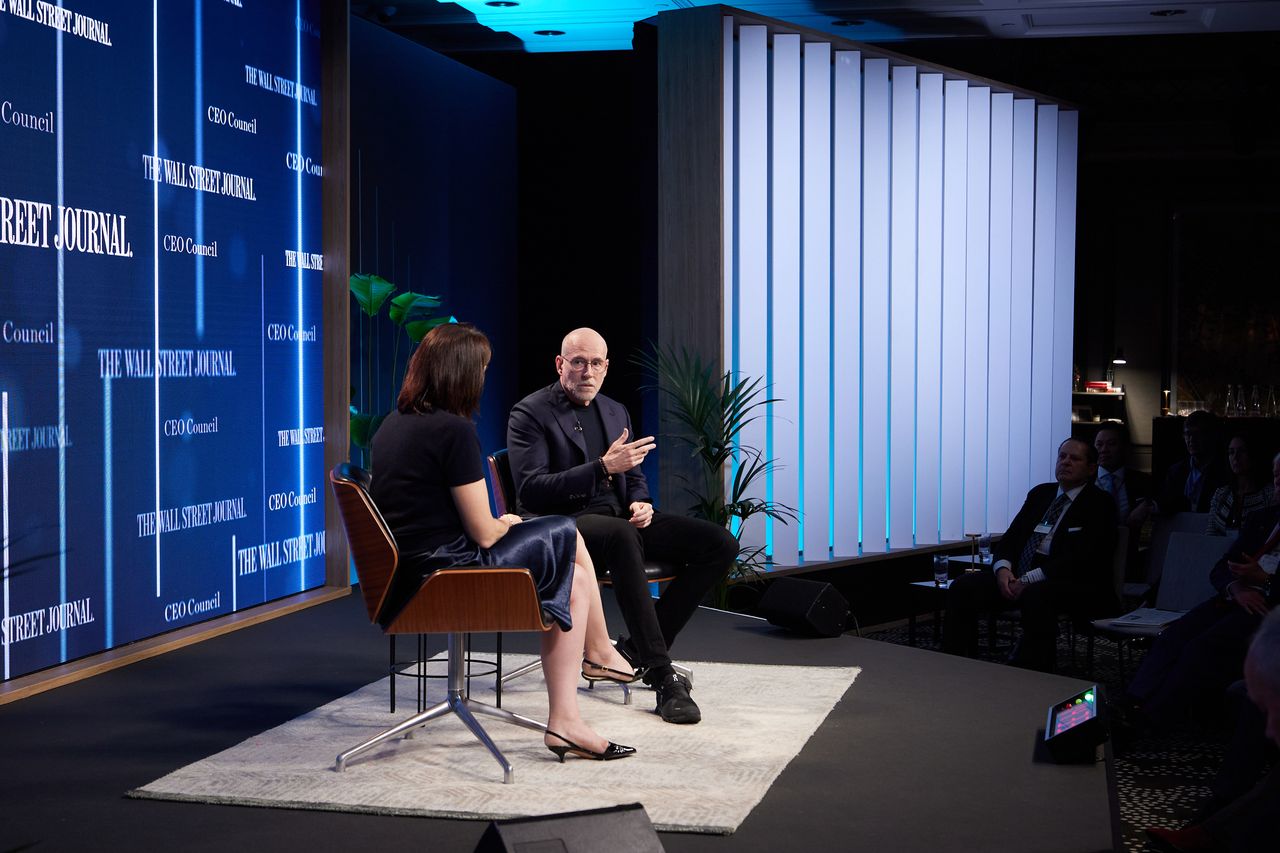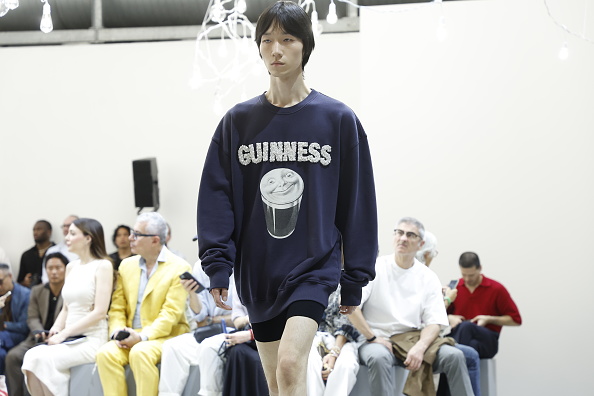Why AI Will Make Our Children More Lonely
The good news, says Scott Galloway, is that AI’s economic impact won’t be the catastrophe that so many are predicting
Scott Galloway, a founder of companies, board member of others, business-school professor and author, is outspoken in his criticism of today’s Big Tech-driven society. At the recent Wall Street Journal CEO Summit in London, he shared some of his views, along with an array of data points, in a wide-ranging, animated talk with Nikki Waller, coverage chief for life and work at The Wall Street Journal. Edited excerpts follow.
The unreal world
WSJ: How will AI change the home and family lives of people in this room?
GALLOWAY: You’ll get richer, and your kids will get lonelier and more depressed.
Most of the technologies we’re coming up with, or a lot of them, are pouring fuel on this flame of loneliness, where we’re finding reasonable facsimiles of a relationship. Social creates this illusion that you have a lot of friends, but you don’t experience friendship.
A lot of young men are self-selecting out of the real world. They believe they’re learning or investing on a trading app, and that’s just gambling. That’s just addiction. They think that they are having a relationship when they’re on Discord, or sharing information. They feel rejected on dating apps. If you’re a young man in the 50th percentile or below in terms of attractiveness, you have to swipe right or select 200 women and say, “I’m interested,” to get one match. If you match, you need five matches for it to turn into one coffee, because four of the five women who have a much finer filter in terms of selectivity, they’ll kind of melt away.
So most men have to match 1,000 times to get one coffee. And that validates that they are not attractive and not valued in the mating market. I think they’re going to increasingly turn to AI-driven relationships.
We have a series of replacements—fuelled by technology—for relationships, mentorships, the workplace, friendships, romantic relationships. And in the short term it sort of fills a void. But it’s empty calories, and I think you end up more depressed.
We’re mammals, and we’re supposed to be around each other. I worry that there’s a whole cohort of young people, specifically young men, who will withdraw slowly but surely from the world. And the output of that is they become really sh—y citizens. They’re more prone to misogynistic content. They’re less likely to believe in climate change. They don’t develop the skills to read a room and be successful at work. They don’t engage in romantic relationships, so they don’t have kids.
WSJ: How do you solve for this in the workplace if you’re a boss?
GALLOWAY: We need systemic solutions. We’ve taken away wood shop, auto shop, metal shop from high schools, and basically told young men in high school to be more like women. “Be organised, disciplined, sit in your seat.” And the education system is highly biased against men.
I think the labor force is quite biased against women still, especially once they have children. But the educational workforce is biased against men. Boys are twice as likely to be suspended than a woman on a behaviour-adjusted basis, the exact same infraction. A Black boy, five times as likely to be suspended.
What you can do as a CEO is, first, drop the fetishisation of elite colleges. There’s going to be two female graduates from college in the next five years for every male. And create more on ramps into your company for kids who don’t have traditional college certification. In terms of the workforce, I’m sort of the person that makes HR uncomfortable, because the No. 1 source of retention at a company is if the employee has a friend.
I’m a big fan of remote work for caregivers. We should have a new classification of worker: For someone who’s taking care of young children, ageing parents, someone who’s struggling with their own health, remote work is a huge unlock. But for people under the age of 40, I think the office is a feature, not a bug. And that is it’s a fantastic place to find friends, mentors and mates. We don’t like to talk about this, but one out of three relationships begins in the workplace.
Ninety-nine percent of relationships that began at work are consensual. And we talk about and we publicise some abhorrent behaviour, and those people deserve to be in prison. But the people who I find are most righteous about being against workplace relationships are already married. And if you’re going to ask a young person to work 12 hours a day in this competitive economy, where are they supposed to find mates?
Work/life balance
WSJ: Gen Z workers, in their first interviews, are asking about work/life balance. What’s the right way to think about that?
GALLOWAY: Work/life balance is a myth. I’ve taught 5,500 students at NYU, and I do a survey. “Where do you expect to be in five years economically?” And something like 90%-plus of them expect to be in the top 1% economically by the age of 30, right? I get it, it’s great. But it means you’re going to have no life other than work, or very little life. I don’t remember my 20s and 30s other than work. It cost me my hair, it cost me my first marriage, and it was worth it.
You can have it all. You just can’t have it all at once. If you expect to be in the top 10% economically, much less the top 1%, buck up. Two-decades-plus of nothing but work. That’s my experience.
The AI future
WSJ: What career advice would you give a young adult right now regarding AI?
GALLOWAY: I’m an AI optimist. But everything in the media on AI is total catastrophising. It’s, “This is the nuclear bomb.”
I’m like, “That’s not that helpful.” Anytime there’s a new technology it goes through the same arc. There’s some catastrophising, there’s some job destruction, and then the economy grows and there’s more jobs.
Automation destroyed a lot of jobs on the shop floor, the manufacturing floor. But we didn’t anticipate heated seats or car stereos, and we created more jobs. I think AI is going to be enormously accretive for society and our economy.
If I were a young person, think about which industry does it disrupt, which industry will have the greatest reshuffling of value? Think about targeting disruption.
I’m not sure people thought processing power would disrupt cable television. But it did, in the form of Netflix.
Netflix’s rise is directly correlated to increase in bandwidth and processing power, because your cable bill kept going up faster than inflation such that you could have Food Networks 3 and 4. So for $12 a month I can get a reasonable facsimile of what was costing me $120 a month.
So what’s next? What does AI kill or disrupt? And where would I invest my human capital as a young person?
The most disruptable industry in the world—as a function of prices increasing faster than inflation relative to the underlying innovation or lack thereof—is, hands down, U.S. healthcare.
I haven’t had health insurance in five years. And when I tell people I don’t have health insurance, it’s like, “You’re a bad citizen. You’re not a good dad.” No, health insurance is nothing but a transfer of wealth from the poor who can’t absorb a big shock to the rich who can.
That is ripe for AI to come in and look at you and say, “You know what? You’re better off taking 4% of your salary, putting into the 401(k), using it if you have a healthcare crisis, but not buying insurance.”
There’s going to be so many little AI-driven healthcare companies that go after the American healthcare complex.
AI for me, if I were 22, 25, 30, and wanted to invest my human capital, I would think, “Where is the real action going to be? A reshuffling of shareholder value?” It’s going to be AI-driven startups in the healthcare space.
 Copyright 2020, Dow Jones & Company, Inc. All Rights Reserved Worldwide. LEARN MORE
Copyright 2020, Dow Jones & Company, Inc. All Rights Reserved Worldwide. LEARN MORE
This stylish family home combines a classic palette and finishes with a flexible floorplan
Just 55 minutes from Sydney, make this your creative getaway located in the majestic Hawkesbury region.
As Paris makes its final preparations for the Olympic games, its residents are busy with their own—packing their suitcases, confirming their reservations, and getting out of town.
Worried about the hordes of crowds and overall chaos the Olympics could bring, Parisians are fleeing the city in droves and inundating resort cities around the country. Hotels and holiday rentals in some of France’s most popular vacation destinations—from the French Riviera in the south to the beaches of Normandy in the north—say they are expecting massive crowds this year in advance of the Olympics. The games will run from July 26-Aug. 1.
“It’s already a major holiday season for us, and beyond that, we have the Olympics,” says Stéphane Personeni, general manager of the Lily of the Valley hotel in Saint Tropez. “People began booking early this year.”
Personeni’s hotel typically has no issues filling its rooms each summer—by May of each year, the luxury hotel typically finds itself completely booked out for the months of July and August. But this year, the 53-room hotel began filling up for summer reservations in February.
“We told our regular guests that everything—hotels, apartments, villas—are going to be hard to find this summer,” Personeni says. His neighbours around Saint Tropez say they’re similarly booked up.
As of March, the online marketplace Gens de Confiance (“Trusted People”), saw a 50% increase in reservations from Parisians seeking vacation rentals outside the capital during the Olympics.
Already, August is a popular vacation time for the French. With a minimum of five weeks of vacation mandated by law, many decide to take the entire month off, renting out villas in beachside destinations for longer periods.
But beyond the typical August travel, the Olympics are having a real impact, says Bertille Marchal, a spokesperson for Gens de Confiance.
“We’ve seen nearly three times more reservations for the dates of the Olympics than the following two weeks,” Marchal says. “The increase is definitely linked to the Olympic Games.”

Getty Images
According to the site, the most sought-out vacation destinations are Morbihan and Loire-Atlantique, a seaside region in the northwest; le Var, a coastal area within the southeast of France along the Côte d’Azur; and the island of Corsica in the Mediterranean.
Meanwhile, the Olympics haven’t necessarily been a boon to foreign tourism in the country. Many tourists who might have otherwise come to France are avoiding it this year in favour of other European capitals. In Paris, demand for stays at high-end hotels has collapsed, with bookings down 50% in July compared to last year, according to UMIH Prestige, which represents hotels charging at least €800 ($865) a night for rooms.
Earlier this year, high-end restaurants and concierges said the Olympics might even be an opportunity to score a hard-get-seat at the city’s fine dining.
In the Occitanie region in southwest France, the overall number of reservations this summer hasn’t changed much from last year, says Vincent Gare, president of the regional tourism committee there.
“But looking further at the numbers, we do see an increase in the clientele coming from the Paris region,” Gare told Le Figaro, noting that the increase in reservations has fallen directly on the dates of the Olympic games.
Michel Barré, a retiree living in Paris’s Le Marais neighbourhood, is one of those opting for the beach rather than the opening ceremony. In January, he booked a stay in Normandy for two weeks.
“Even though it’s a major European capital, Paris is still a small city—it’s a massive effort to host all of these events,” Barré says. “The Olympics are going to be a mess.”
More than anything, he just wants some calm after an event-filled summer in Paris, which just before the Olympics experienced the drama of a snap election called by Macron.
“It’s been a hectic summer here,” he says.

AFP via Getty Images
Parisians—Barré included—feel that the city, by over-catering to its tourists, is driving out many residents.
Parts of the Seine—usually one of the most popular summertime hangout spots —have been closed off for weeks as the city installs bleachers and Olympics signage. In certain neighbourhoods, residents will need to scan a QR code with police to access their own apartments. And from the Olympics to Sept. 8, Paris is nearly doubling the price of transit tickets from €2.15 to €4 per ride.
The city’s clear willingness to capitalise on its tourists has motivated some residents to do the same. In March, the number of active Airbnb listings in Paris reached an all-time high as hosts rushed to list their apartments. Listings grew 40% from the same time last year, according to the company.
With their regular clients taking off, Parisian restaurants and merchants are complaining that business is down.
“Are there any Parisians left in Paris?” Alaine Fontaine, president of the restaurant industry association, told the radio station Franceinfo on Sunday. “For the last three weeks, there haven’t been any here.”
Still, for all the talk of those leaving, there are plenty who have decided to stick around.
Jay Swanson, an American expat and YouTuber, can’t imagine leaving during the Olympics—he secured his tickets to see ping pong and volleyball last year. He’s also less concerned about the crowds and road closures than others, having just put together a series of videos explaining how to navigate Paris during the games.
“It’s been 100 years since the Games came to Paris; when else will we get a chance to host the world like this?” Swanson says. “So many Parisians are leaving and tourism is down, so not only will it be quiet but the only people left will be here for a party.”
This stylish family home combines a classic palette and finishes with a flexible floorplan
Just 55 minutes from Sydney, make this your creative getaway located in the majestic Hawkesbury region.






















